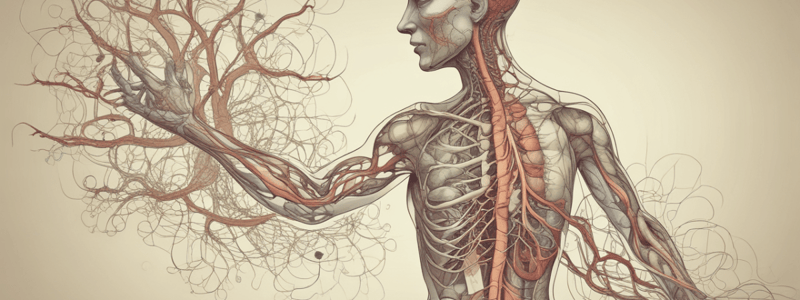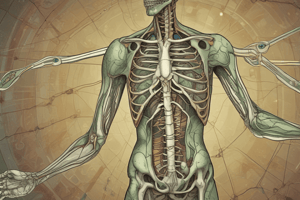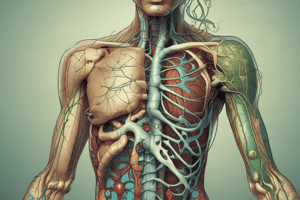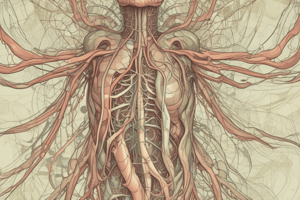Podcast
Questions and Answers
What is the main function of the lymphatic system in the body?
What is the main function of the lymphatic system in the body?
- To filter waste from the blood
- To circulate oxygen throughout the body
- To produce immune cells
- To remove tissue fluid from interstitial spaces and return it to the blood (correct)
What is the term given to the tissue fluid once it has entered a lymphatic vessel?
What is the term given to the tissue fluid once it has entered a lymphatic vessel?
- Serum
- Lymph (correct)
- Plasma
- Blood
Which of the following tissues or organs do not have lymphatics?
Which of the following tissues or organs do not have lymphatics?
- Liver
- Skin
- Muscle
- Cartilage (correct)
What is the characteristic of lymphatic capillaries?
What is the characteristic of lymphatic capillaries?
What is the function of lymphatic anchoring filaments?
What is the function of lymphatic anchoring filaments?
What is the term given to a rounded mass of packed small B-lymphocytes?
What is the term given to a rounded mass of packed small B-lymphocytes?
What is the characteristic of the peripheral zone of a lymphatic nodule?
What is the characteristic of the peripheral zone of a lymphatic nodule?
What is the function of macrophages in lymphatic nodules?
What is the function of macrophages in lymphatic nodules?
Where are lymphatic nodules typically found?
Where are lymphatic nodules typically found?
What is the function of lymphatic nodules in terms of antibody production?
What is the function of lymphatic nodules in terms of antibody production?
What is the primary function of primary lymphoid organs?
What is the primary function of primary lymphoid organs?
What is the normal fate of the thymus during puberty?
What is the normal fate of the thymus during puberty?
Where is the thymus situated in the body?
Where is the thymus situated in the body?
What is unique about the thymus in terms of T-cell specificity?
What is unique about the thymus in terms of T-cell specificity?
What is the function of the desmosomes in the thymic epithelial cells?
What is the function of the desmosomes in the thymic epithelial cells?
What is the main difference between the cortex and medulla in the thymus?
What is the main difference between the cortex and medulla in the thymus?
What is the function of the Hassall's corpuscles in the thymus?
What is the function of the Hassall's corpuscles in the thymus?
What is the shape of a lymph node?
What is the shape of a lymph node?
Where do the efferent lymphatics leave the lymph node?
Where do the efferent lymphatics leave the lymph node?
What enters the lymph node at the convex surface?
What enters the lymph node at the convex surface?
Flashcards are hidden until you start studying
Study Notes
Lymphatic System
- Formed from lymph vessels and lymphatic tissue
- Assists the cardiovascular system in removing tissue fluid from interstitial spaces and returning it to the blood
- Lymph is the name given to tissue fluid once it enters a lymphatic vessel
Lymphatic Vessels
- Lymphatic capillaries: small, thin-walled, irregularly shaped endothelial tubes surrounded by delicate connective tissue with lymphatic anchoring filaments
- Small and medium-sized lymphatics: have an endothelial lining and a layer of connective tissue
- Large lymphatics: similar to veins, with three layers and valves to prevent backflow
Lymphatic Nodules
- Rounded, circumscribed masses of cells
- Primary nodule: packed small B lymphocytes
- Secondary nodule: formed of a central pale germinal center and a peripheral dark zone
- Sites: lamina propria of digestive and respiratory passages, white pulp of the spleen, and lymph nodes
- Functions: produce lymphocytes, have phagocytic activity, and produce antibodies
Lymphatic Organs
- Primary lymphoid organs: bone marrow and thymus, responsible for development and maturation of lymphocytes
- Secondary lymphoid organs: provide sites for immunocompetent cells to react with antigens and build up immunological response
- Secondary lymphoid organs include: lymph nodes, spleen, tonsils, and mucosa-associated lymphoid tissues
Thymus
- Primary lymphoid organ responsible for maturation of T-lymphocytes
- Site: superior mediastinum
- T-cell specificity is acquired only in the thymus
- Structure: 2 lobes, with each lobule divided into dark peripheral cortex and pale central medulla
- Cortex: contains epithelial reticular cells, immature T-lymphoblasts, mature T-lymphocytes, and macrophages
- Medulla: contains thymic epithelial cells, Hassall's corpuscles, and mature T-lymphocytes
Lymph Node
- Ovoid or kidney-shaped body
- Convex surface: afferent lymphatics enter
- Hilum: efferent lymphatics leave, and blood vessels and nerves enter or leave
Studying That Suits You
Use AI to generate personalized quizzes and flashcards to suit your learning preferences.




